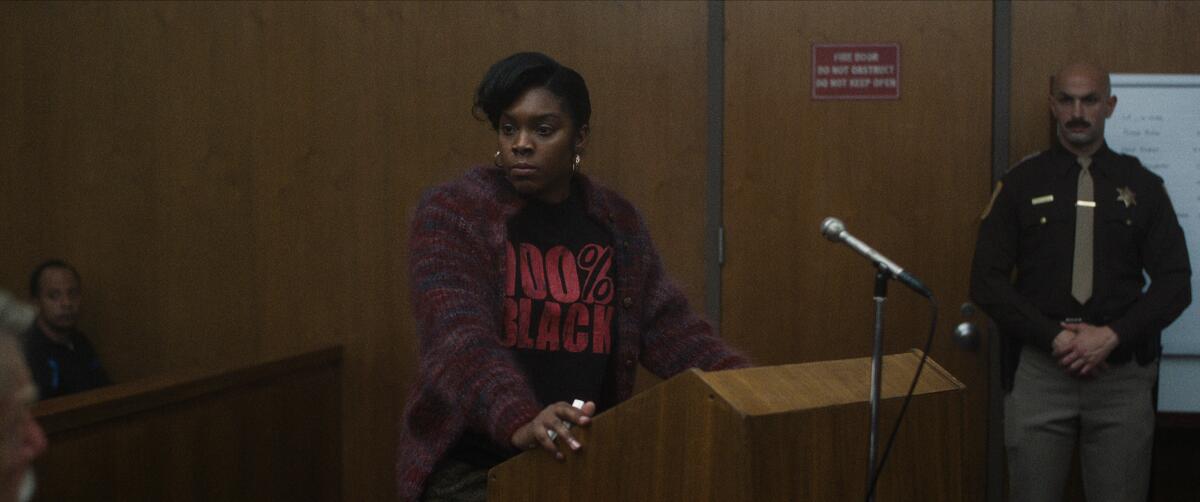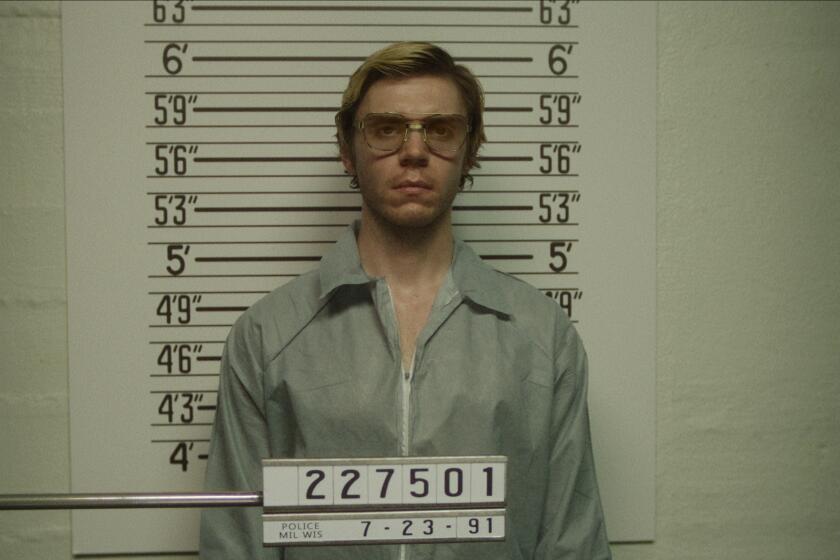Critics of Netflix’s controversial ‘Dahmer’ open up about lack of ‘respect’ they felt

- Share via
Ryan Murphy and Ian Brennan’s “Dahmer — Monster: The Jeffrey Dahmer Story,” starring Evan Peters as the notorious Milwaukee serial killer, has already broken Netflix’s worldwide record for a series debut in its opening week, according to the streamer. But it’s sparked a controversy in the process.
Set off last week in a viral Twitter thread by Eric Perry, a relative of Dahmer victim Errol Lindsey, the series has been accused of profiting off of the trauma suffered by those Dahmer murdered — many LGBTQ+ people of color — and those who survive them.
“Unfortunately a lot of the comments I’ve received [about the series] have said we should be grateful this story is being told,” Perry, 33, tells The Times. “I want people to understand this is not just a story or historical fact, these are real people’s lives. [Lindsey] was someone’s son, someone’s brother, someone’s father, someone’s friend that was ripped from [our] lives.”
Also the subject of a forthcoming Netflix docuseries, “Conversations With a Killer: The Jeffrey Dahmer Tapes,” Dahmer, who killed, dismembered and in some cases cannibalized 17 men and boys between the late 1970s and his capture in 1991, is just the latest in a string of serial killers to have their stories told, and retold, on the platform. For Perry, that comes with a certain responsibility.
Netflix dropped ‘Monster: The Jeffrey Dahmer Story’ this week and received criticism from one of the victim’s loved ones, among others. Evan Peters stars as the serial killer.
“I think social media and Netflix, combined with a big-name producer and actors, really amplified [Jeffrey Dahmer] more than I’ve ever noticed it before. [Dahmer] has never been a meme before,” he said. “We’re all one traumatic event away from the worst day of your life being reduced to your neighbor’s favorite binge show. And most importantly, if you’re going to create something that uses real-world people and experiences, you should at minimum contact those people out of respect.”
Netflix declined to comment on Perry’s criticism or the involvement of victims’ families or victim advocates in “Dahmer.” (The families of victims in the Atlanta child murders, the subject of Netflix’s “Mindhunter” Season 2, were not contacted, The Times reported in 2019.)
Lindsey’s sister, Rita Isbell — who shared an enraged victim-impact statement during 1992 court proceedings, a moment portrayed in “Dahmer” by DaShawn Barnes — has also spoken out against the series. In an as-told-to essay published by Insider, Isbell lambasted the entertainment industry’s commercialization of tragedy.
“I don’t need to watch it, I lived it,” Isbell, now in her 60s, says in the piece, claiming that Netflix never contacted her about “Dahmer” or her depiction in it. She also writes that she wishes the streamer “asked if [the victims’ families] mind or how [we] felt about making it. They didn’t ask [us] anything. They just did it.”
Season 2 of Netflix’s “Mindhunter” re-examines the killings of two dozen black youths in Atlanta from 1979 to 1981. But no victims’ families were consulted in the process.
The criticism has not only come from those who see themselves or their family members in the series, though. It’s also come from those who worked on “Dahmer.” Production assistant Kim Alsup, who tweeted that she was “treated horribly” on set, tells The Times that she hasn’t watched the series yet because of that experience: “I just feel like it’s going to bring back too many memories of working on it. I don’t want to have these PTSD types of situations. The trailer itself gave me PTSD, which is why I ended up writing that tweet and I didn’t think that anybody was going to read.”
“It was one of the worst shows that I’ve ever worked on” as a Black woman, Alsup added, reiterating the claim that she was one of only two Black crew members below the line on “Dahmer” — and that she was regularly mistaken for the other. “I was always being called someone else’s name, the only other Black girl who looked nothing like me, and I learned the names for 300 background extras.”
Alsup did eventually see her experience improve during production on Episode 6, “Silenced,” written by a Black woman (Janet Mock) and directed by a Black man (TV veteran Paris Barclay). The episode establishes the backstory of deaf victim Tony Hughes by detailing his close relationship with his mother.
In the main, though, she found the experience “exhausting” and the set — which she alleges had no mental health coordinators available — an unsupportive environment. Such roles have become more common as the industry has reckoned with the toll that depicting traumatic experiences can take on cast and crew; for instance, director Barry Jenkins hired a counselor for his Prime Video series set in the antebellum South, “The Underground Railroad.” Netflix declined to comment on Alsup’s claims about the on-set work environment or number of Black crew members. All crew are provided access to free health and wellness resources, including access to a licensed therapist, according to a Netflix spokesperson.
Others involved in the series have come out in support of the project. Among its defenders is Shaun Brown, who plays Tracy Edwards, who was able to evade Dahmer and whose contact with police led to the serial killer’s eventual arrest. In a statement on social media, Brown pointed to the series’ efforts to shine a light on oft-forgotten figures in the Dahmer case like Edwards.
“It’s very strange getting attention for someone else’s misery,” Brown wrote. “I hope you have love for all the victims and maybe in time you have more love for one another.”







